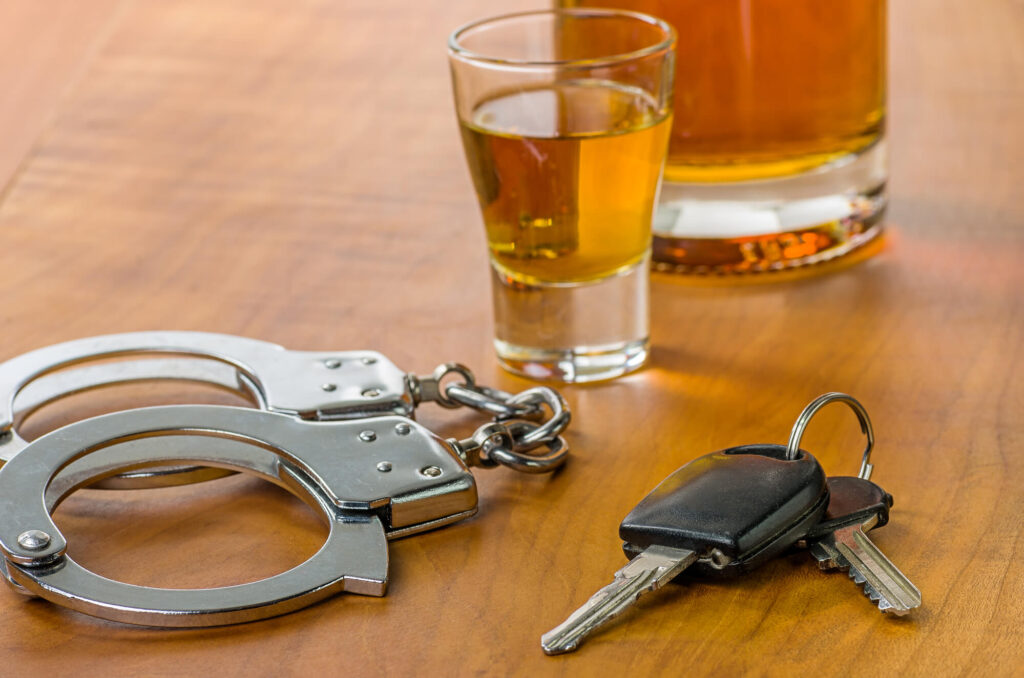Being convicted or even just being charged with driving while intoxicated (DWI) can have very real and specific consequences on a person’s life. In addition to the criminal penalties involved, there are very severe civil penalties, which affect the offender’s ability to drive.
These civil penalties can sometimes be worse than the criminal ones due to the high fines that are involved. Many people believe that being charged with a DWI means that there will be an automatic conviction. However, an experienced DWI defense attorney like Brett Podolsky may be able to have the DWI penalties lessened or the charges dismissed altogether. Whether it is your first offense or your second or third DWI charge, reliable legal defense is your best protection.
DWI charges can be scary – especially if you’re an otherwise upstanding citizen. If convicted, you could face revocation of your driver’s license, fines, probation, and/or jail time.

Are you facing criminal charges for DWI in the state of Texas? Allow attorney Brett Podolsky to help you navigate a complex legal system. He has a strong track record of defending his clients and getting the best results possible.
Although generally used to refer to drinking and driving, a DWI may refer to other types of intoxication. A driver can be considered intoxicated if a substance negatively affects their driving. Intoxication can be caused by:
For alcohol, drivers over the age of 21 with a blood-alcohol level of .08 or higher will be considered intoxicated. Drivers under the age of 21 will be considered intoxicated with a blood-alcohol level of .02.
A police officer must have probable cause to stop you and arrest you with a DWI charge. Swerving, speeding or running a red light can provide probable cause for a traffic stop by the police. An open container of alcohol in the vehicle, failure to pass a field sobriety test or admitting to drinking alcohol can also result in a DWI arrest.
A first time conviction for DWI will be considered a Class B misdemeanor. Punishment can include up to 6 months in jail, fines, a suspended driver’s license and court ordered alcohol treatment. Texas will also impose a DWI surcharge of $1,000 every year for the next three years as an administrative fee. If this fee is not paid, Texas will not issue the person a valid driver’s license.
Multiple DWI convictions in Texas bring serious consequences. Repeated crimes bring harsher penalties. Police must have probable cause to make a traffic stop and make a DWI arrest.
For a second offense DWI, the criminal classification becomes a Class A misdemeanor. The time in jail can be anywhere from 30 days to up to one year, and the defendant may be fined as much as $4,000. The person’s driver’s license can also be suspended for up to two years.
If a person is convicted of DWI for a third time, they will be convicted of a third degree felony. In addition to the penalties listed above, the fine can increase to $10,000 and two to ten years in prison. After a third DWI conviction, the Texas Criminal Code does not provide for any increased penalties. However, a judge or jury will consider the offender’s prior driving record and will likely impose more prison time for each subsequent offense.
If a person operates a motor vehicle in a public place, operates an aircraft, watercraft, or amusement ride, or assembles a mobile amusement ride and is intoxicated – and by reason of intoxication causes the death of another by accident or mistake, they can be charged with intoxication manslaughter.
Intoxication manslaughter is a second-degree felony with two to 20 years in prison and a fine of up to $10,000. It may also include probation, community service, a suspended driver’s license, and mandatory alcohol or drug treatment.
Suppose the defendant has a prior felony conviction. In that case, they may be not be allowed to carry firearms and may be refused federal financial aid or student loans. In Texas, the offender may not vote until the sentence is complete, including all probation or parole requirements, if applicable.
Texas takes a dim view of DWI, and the outlook darkens further when the driver has a minor in the car.
DWI with a minor passenger is driving while intoxicated with a passenger under the age of 18. It is also used for driving while intoxicated with a child passenger who is 15 or younger. The driver can face additional charges of child neglect or child abuse. Civil action could follow if an accident with injuries occurs.
The charge of DWI with a minor passenger or child passenger is a state jail felony that can result in between 180 days to two years in jail and a fine of up to $10,000. The driver may also receive administrative penalties from the Texas Department of Motor Vehicles or have their license revoked. Loss of employment, professional license, child custody, and visitation may occur also.
Implied consent in Texas means that by accepting a driver’s license in Texas, the motorist automatically agrees to chemical testing if lawfully stopped and the officer has just cause to believe the driver is intoxicated. This includes automobiles and boats.
A motorist can refuse a blood draw, but the officer can petition a judge for a warrant to take blood anyway. Law enforcement administers a blood alcohol test anytime someone is taken into custody on suspicion of drinking and driving. Also, Texas sets up “no-refusal” checkpoints, and judges are on hand to sign warrants to take blood forcibly.
Under certain circumstances, an officer can take a blood sample without consent or a warrant:
Law enforcement uses several methods to determine whether a motorist may be intoxicated.
A breathalyzer test measures alcohol in respiration. A failed breath test results in a 90-day driver’s license suspension if the individual has no prior alcohol or drug-related enforcement contacts listed on their driving record within the past ten years. The suspension extends to one year if the motorist has one or more alcohol or drug-related contacts in the last ten years.
Refusing a breath test or other field sobriety test results in a 180-day suspension with no prior alcohol or drug-related contact. The period extends to two years if there are prior contacts.
Law enforcement also uses field sobriety tests – a battery of mental and physical tests developed by the National Highway Traffic Safety Administration (NHTSA) to assess an individual’s overall impairment. These tests determine if someone has lost the normal use of their mental or physical faculties due to the introduction of a chemical substance, typically alcohol.
Tests include divided attention tests where the individual must concentrate on more than one task at a time. The tests also include the standard tests for horizontal Gaze Nystagmus (HGN), One Leg Stand (OLS), and Walk and Turn (W&T). These tests are not 100% accurate even when administered and interpreted perfectly.
Some agencies use non-standard tests like counting backward, saying part of the alphabet, touching finger to nose, and a stationary balance with the eyes closed and the head tilted.
Everyone has the right to refuse field sobriety tests. However, they must request an ALR (Administrative License Revocation) hearing within 15 days to challenge the license suspension; otherwise, the suspension is automatic. For comparison, after a failed blood or breath test, the license is suspended for 90 days. Refusal of field sobriety testing results in an automatic suspension for 180 days.
A blood test measures the alcohol in the bloodstream at the time the blood was drawn. Anything over 0.08 is considered DWI. For a minor, the law is zero tolerance. Any measurable alcohol in the blood is grounds for a DUI.
The penalties for DWI include incarceration, fines, loss of driving privileges, mandatory alcohol or drug counseling, and probation.
Underage DWI occurs when the driver under the age of 21 is found to have any alcohol in the bloodstream. In Texas, someone who is under 21 can be charged with DUI – Driving Under the Influence. It’s a Class C misdemeanor with a fine of up to $500, suspension of the driver’s license, 20 to 40 hours of community service, and court-ordered participation in alcohol or drug counseling.
DWI – Driving While Intoxicated – is a more serious charge than DUI.
DWI with a BAC of 0.08 is a Class B misdemeanor with a minimum of 72 hours and up to 180 days in jail, fines up to $2,000, and an annual fee tacked onto the driver’s license renewal of $1,000 to $2,000 annually for up to three years. Also, the motorist’s license is suspended and receives a sentence of court-ordered participation in an alcohol or drug program, court-ordered community service, and mandatory probation.
If the BAC is over 0.15, the charge is elevated to a Class A misdemeanor. If someone is injured because a motorist is intoxicated, the crime becomes a felony.
Punishment depends on the age of the minor. The law requires the minor to remain in jail until a magistrate sets bond. If the individual is 16 or under, they are taken to juvenile detention instead of jail.
Defendants between the age of 18 and 21 can be charged up to $500 in fines, up to 40 hours of community service, and mandatory alcohol abuse classes. Anyone under 18 faces the same sanctions, but the parents or guardians must attend alcohol abuse classes and all court hearings.
Both age groups may become eligible for deferred adjudication and later expunction of their records.
An experienced criminal defense attorney will know how to successfully defend a DWI. Brett Podolsky has defended numerous DWI cases and has a proven track record of positive results. He helps clients achieve the best possible outcome for their case.
Contact the Law Office of Brett A. Podolsky at 713-227-0087 for a free consultation.


The New, Free Ebook From the Law Office of Brett A. Podolsky
Have you or someone you know been charged with a crime? The legal system is complex and can be intimidating. With our free ebook, you can learn more about the legal process and exactly how a criminal defense attorney, like Brett Podolsky, can help defend you.
Stop wondering “What’s next?” Get your free ebook and start getting answers to your legal questions.
Houston criminal defense lawyer Brett A. Podolsky is a former prosecutor for the State of Texas. He uses his years of criminal trial experience and knowledge of the criminal laws to advise and defend people.